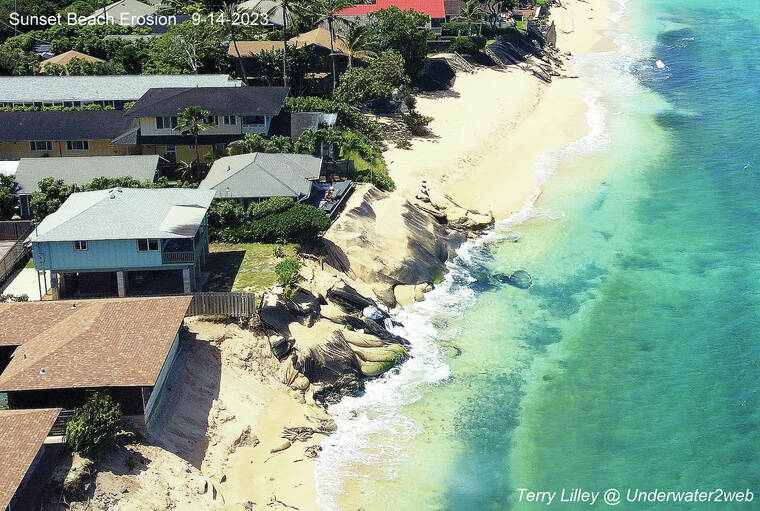Forty-foot waves along O‘ahu North Shore this week! Another home falls into the sea. I can just visualize the headlines in all of the newspapers, but this does not need to happen to our coastal homes and roads.
Nature has a way of protecting our beaches from erosion even in giant surf. A healthy coral reef is nature’s natural seawall and live corals have been protecting Hawaiian beaches for thousands of years before humans arrived on these remote islands.
In Hawai‘i, we have more than 20 species of stony corals that are rock hard reef builders. When one coral dies it leaves behind a calcium carbonate skeleton that is made from the same material as concrete. Over time, new corals grow on top of the dead coral and this causes the reef to grow in size.
Corals grow upward like trees do because they need the sun’s energy to produce food. Some of our Hawaiian coral reefs are over 30 feet tall and most of our stony corals can grow upward from 2 inches to 6 inches per year.
Sea level rise is causing coastal erosion in many places around the world, but some tropical islands are not being affected by sea level rise because their barrier coral reef is growing upward faster than the sea level is rising. The live coral reef drags on the underside of the giant waves causing the wave to break on the reef.
The live corals can absorb the waves energy, so when the surf hits the beach it has lost most of its power and this keeps the beach from eroding. Simple cause and effect. If the corals die, the reef lowers instead of growing upwards. This causes more of the waves energy to directly hit the sandy beach which causes excess erosion.
In 2010 I did an extensive underwater coral reef research project and movie documenting the health of the corals along O‘ahu’s North Shore. The near-shore corals look pretty healthy. I went back and did the same study of the reef in 2015, and the corals from Sunset Beach to Waimea Bay had died.
The reef lowered in height more than 2 feet due to the dead coral and no new coral growing on top of it. I was alarmed by what I captured on video, so I made a movie about it and contacted the media in O‘ahu. We met up on the beach near Sunset, and I did a story talking about the dying coral reef and how that would soon cause a major beach erosion problem. Sure enough, by 2021 the beach was gone and homes were falling into the sea.
According to the County of O‘ahu, it may cost over a billion dollars to remove homes from the beach and move the highway back so it will not fall into the sea due to the rising sea levels. Maybe it would be wise to study the coral reef and figure out what killed the live corals to begin with, then fix that problem so the corals can grow back and protect the beach naturally.
Almost no effort is being put into the study of O‘ahu and Kaua‘i north shore coral reefs, so we don’t know what is killing them. The corals could be dying due to runoff from farm chemicals, or leaking cesspools, destruction of the coastal wetlands, or even ongoing military submarine activity discharging electricity into the reef. We simply don’t know because we are not doing the right studies to figure it out.
We have some tough decisions to make about our beaches here in Hawai‘i soon because they are disappearing quickly and it is going to cost a lot of money to move homes and roads inland, when we could be studying our coral reefs and restoring them so nature can do the job of protecting our beaches.
You can see the coral reef dying in my video “Surf and Reef Pipeline” at https://www.youtube.com/watch?v=NCOVciuYjg8&authuser=0 and see the effects of the dying reef on the beach between Sunset and Rocky Point. The quality of the surf also changes when the corals die along with the concentration of fish, so there are many reasons to study our coral reefs and keep them as healthy as possible.
•••
Terry Lilley is a marine biologist living in Hanalei Kaua‘i and co-founder of Reef Guardians Hawai‘i, a nonprofit on a mission to provide education and resources to protect the coral reef. To donate to Reef Guardians Hawaii go to www.reefguardianshawaii.org.





